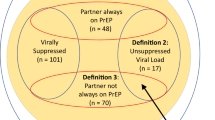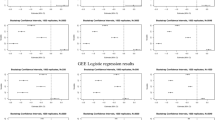Abstract
Investigators conducting HIV studies ask participants multiple questions about sexual risk behaviors with their partners to ensure that they can describe the level of HIV risky sexual behavior. The assessment should be as short as possible because of the expense of collecting the data, the burden to the research subject, and ethical concerns. This study used data from the NIMH Collaborative HIV/STD Prevention Trial to answer the question about how many non-spousal/non live-in partners a research participant needs to be asked about to capture sufficient sexual risk behavior (not using a condom with a non-spousal/non live-in partner in the last 3 months). The data provided evidence that 95 % of the sexual risk behavior was captured by asking about two partners while 98 % was captured by three partners. As research funds become increasingly limited, it is important to design as parsimonious and robust a study as possible.
Similar content being viewed by others
References
NIMH Collaborative HIV/STD Prevention Trial Group. Methodological overview of a five-country community-level HIV/sexually transmitted disease prevention trial. AIDS. 2007;21(Suppl 2):S3–18.
NIMH Collaborative HIV/STD Prevention Trial Group. Selection of populations represented in the NIMH collaborative HIV/STD prevention trial. AIDS. 2007;21(Suppl 2):S19–28.
NIMH Collaborative HIV/STD Prevention Trial Group. (2010). The NIMH Collaborative HIV/STD Prevention Trial Group. Results of the NIMH collaborative HIV/STD prevention trial of a community popular opinion leader intervention. J Acquir Immune Defic Syndr. 2010;54(2):204–14.
Hartwell TD, Pequegnat W, Moore JL, Parker CB, Strader LC, Green AM, Wasserheit JN, Klausner JD, NIMH Collaborative HIV/STD Prevention Trial Group. The utility of a composite biological endpoint in HIV/STD prevention trials. AIDS Behav. 2013;17(9):2803–901.
The output, code, and data analysis for this paper was generated using SAS software. Copyright © 2002-2010 by SAS Institute Inc. SAS and all other SAS Institute Inc. product or service names are registered trademarks or trademarks of SAS Institute Inc., Cary, NC, USA. SAS® Proprietary Software 9.3 (TS1M1) on W32 7PRO platform, SAS/STAT 9.3_M1.
Acknowledgments
This study was supported by the National Institute of Mental Health (NIMH) through the Cooperative Agreement mechanism (UlOMH061499, UlOMH061513, UlOMH061536, UlOMH061537, UlOMH061543, UlOMH061544). We would also like to acknowledge all those who participated in and staffed the NIMH Collaborative HIV/STD Prevention Trial.
Author information
Authors and Affiliations
Consortia
Corresponding author
Additional information
The NIMH Collaborative HIV/STD Prevention Trial Group: Research Steering Committee/Site Principal Investigators and NIMH Senior Scientist: Carlos F. Caceres, MD, PhD (Cayetano Heredia University (UPCH)); David D. Celentano, ScD (Johns Hopkins University); Thomas J. Coates, PhD (David Geffen School of Medicine, University of California, Los Angeles [UCLA]); Tyler D. Hartwell, PhD (Research Triangle Institute International); Danuta Kasprzyk, PhD (Battelle); Jeffrey A. Kelly, PhD (Medical College of Wisconsin); Andrei P. Kozlov, PhD (Biomedical Center, St. Petersburg State University); Willo Pequegnat, PhD (National Institute of Mental Health); Mary Jane Rotheram-Borus, PhD (UCLA); Suniti Solomon†, MD (Center for AIDS Research and Education [YRG CARE]); Godfrey Woelk, PhD (University of Zimbabwe Medical School); Zunyou Wu, PhD (Chinese Center for Disease Control and Prevention).
Collaborating Scientists/Co-Investigators: Roman Dyatlov, PhD-(Biomedical Center, St. Petersburg State University); A. K. Ganesh, ACA, BCom (YRG CARE); Li Li, PhD (UCLA); Sudha Sivaram, PhD, MPH (Johns Hopkins University); Anton M. Somlai, EdD (Medical College of Wisconsin).
Assessment Workgroup: Eric G. Benotsch, PhD (Medical College of Wisconsin); Juliana Granskaya, PhD (St. Petersburg State University; The Biomedical Center); Jihui Guan, MD (Fujian Center for Disease Control and Prevention); Martha Lee, PhD (UCLA); Daniel E. Montaño, PhD (Battelle).
Biologic Outcomes Workgroup: Nadia Abdala, PhD (Yale University); Roger Detels, MD, MS (UCLA); David Katzenstein, MD (Stanford); Jeffrey Klausner, MD, MPH (Department of Public Health, San Francisco).
†Deceased.
Rights and permissions
About this article
Cite this article
Pequegnat, W., Hartwell, T.D., Green, A.M. et al. How Many Sexual Partners of an Individual Need to Be Evaluated to Capture HIV/STI Risk Behavior in a Study?. AIDS Behav 20, 1353–1359 (2016). https://doi.org/10.1007/s10461-015-1137-4
Published:
Issue Date:
DOI: https://doi.org/10.1007/s10461-015-1137-4




